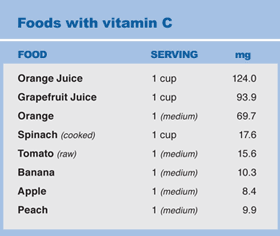Vitamin C
 Vitamin C (ascorbic acid) is an antioxidant found in fruits and vegetables. Scientific evidence suggests vitamin C lowers the risk of developing cataracts, and when taken in combination with other essential nutrients, can slow the progression of age-related macular degeneration (AMD) and visual acuity loss.
Vitamin C (ascorbic acid) is an antioxidant found in fruits and vegetables. Scientific evidence suggests vitamin C lowers the risk of developing cataracts, and when taken in combination with other essential nutrients, can slow the progression of age-related macular degeneration (AMD) and visual acuity loss.AMD and cataract incidence are growing. Worldwide, more than 25 million people are affected by age-related macular degeneration (AMD) and the formation of cataracts. AMD is the leading cause of blindness in people over age 55 in the Western world and the incidence is expected to triple by 2025. Smoking, diabetes and the use of steroids are all risk factors for cataract formation as they all deplete the eye's lens of vitamin C.
Benefits to Eye Health
Vitamin C helps to promote healthy capillaries, gums, teeth, cartilage and the absorption of iron. Virtually all cells of the body depend on it, including those of the eye where it is actively concentrated in all tissues. Vitamin C also supports the health of ocular blood vessels. Our bodies do not synthesize the vitamin C needed, which is the reason citrus fruits and juices are essential to good nutrition. Daily intake of vitamin C through diet, nutritional supplements, or fortified foods and beverages is important for the maintenance of good eye health.
Vitamin C and Cataracts
Numerous studies have linked vitamin C intake and ocular health. A study demonstrated that women using vitamin C for 10 years or more experienced a 64 percent reduction in the risk of developing nuclear cataracts. Researchers estimate that half of cataract-related surgeries could be averted by delaying the onset of cataracts for 10 years.
Other research showed that women taking a daily supplementation dosage of 364 mg experienced a 57 percent reduction in their risk of certain types of cataracts. The research concluded that periods shorter than 10 years are insufficient to measure the influence of vitamin C upon cataract formation. Therefore, a 300 mg/day intake of vitamin C appears to be the minimum point at which cataract prevention occurs.
Vitamin C and Age-Related Macular Degeneration (AMD)
The Age-Related Eye Disease Study (AREDS), sponsored by the National Eye Institute, was a landmark study that established AMD as a ‘nutrition-responsive disorder.’ The study showed that a 500 mg/day intake of vitamin C, taken with antioxidants beta-carotene, vitamin E and zinc supplementation, slows the progression of advanced age-related macular degeneration by about 25 percent and visual acuity loss by 19 percent in individuals at high-risk for the disease. Emerging science, consisting of the AREDS results and seven smaller studies, have confirmed these results.
Daily Intake*

The U.S. Food and Drug Administration (FDA) has established a dietary reference intake (DRI) for vitamin C of 90 mg/day for males and 75 mg/day for females. It has long been recognized that people under stress require more vitamin C than the recommended daily allowance. These groups include smokers, alcoholics, diabetics, pregnant or breast feeding women, older adults, athletes and people with chronic diseases who experience environmental stress from heat, cold, or radiation. There is little scientifically documented risk in taking higher doses of vitamin C, except for incurring diarrhea.
Food Sources
Vitamin C is found almost exclusively in fruits and vegetables, including citrus fruits such as oranges, lemons, grapefruit and limes. The table above lists foods known to be high in vitamin C antioxidants. If you are not getting enough vitamin C through diet alone, consider adding one of the widely available vitamin C supplements to your daily routine. However, always consult with a health care professional before beginning a supplementation regiment.
References
- Sardi B, Basic Health User’s Guide to Eye Health Vitamins, Jack Challem, Editor, North Bergen, NJ, 92 pp, 2003.
- Evans J, Antioxidant supplements to prevent or slow down the progression of AMD: a systematic review and meta-analysis, Eye.2008 Jun; 22(6):751-60.
- Jacques PF, Chylack LT Jr, Hankinson SE, Khu PM, Rogers G, Friend J, Tung W, Wolfe JK, Padhye N, Willett WC, Taylor A, Long-term nutrient intake and early age-related nuclear lens opacities. Archives Ophthalmology 119, 1009-19, 2001.
- Taylor A, Cataract and macular degeneration: relationship to long-term ascorbate intake. Clinical Chemistry, 39: 1305, 1993.
- Jacques PF, Taylor A, Hankinson SE, et al Long-term vitamin C supplement use and prevalence of early age-related lens opacities, Am J Clinical Nut 66, 911-16, 1997.
- Chiu CJ & Taylor A, Nutritional antioxidants and age related cataract and maculopathy, Exp Eye Res July 2006.
- Age-Related Eye Disease Study Research Group, A randomized, placebo-controlled, clinical trial of high-dose supplementation with vitamins C and E, beta carotene, and zinc for age-related macular degeneration and vision loss: AREDS report no. 8, Arch Ophthalmol. 119(10):1417-36, 2001.
- Evans J, Antioxidant supplements to prevent or slow down the progression of AMD: a systematic review and meta-analysis, Eye. 2008 Jun; 22(6):751-60. E-publication 2008 Apr 18.
*At this time, the AOA is unaware of any studies that have examined interactions between medications and vitamin C. The AOA also is not aware of any adverse health reports from interactions between medications and vitamin C. However, the AOA recommends consulting with a health care professional before beginning any supplementation regiment.
